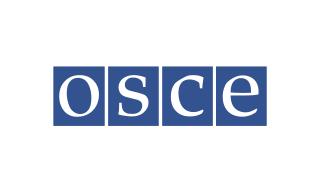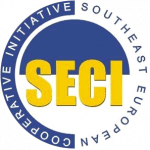Related Research Articles

The Organization for Security and Co-operation in Europe (OSCE) is a regional security-oriented intergovernmental organization comprising member states in Europe, North America, and Asia. Its mandate includes issues such as arms control, the promotion of human rights, freedom of the press, and free and fair elections. It employs around 3,460 people, mostly in its field operations but also in its secretariat in Vienna, Austria, and its institutions. It has observer status at the United Nations.

The United Nations Interim Administration Mission in Kosovo is the officially mandated mission of the United Nations in Kosovo. The UNMIK describes its mandate as being to "help the United Nations Security Council achieve an overall objective, namely, to ensure conditions for a peaceful and normal life for all inhabitants of Kosovo and advance regional stability in the Western Balkans."

Paul R. Williams is a professor at American University, where he teaches in the School of International Service and the Washington College of Law, holding the Rebecca Grazier Professorship in Law and International Relations. He is the president and co-founder of the Public International Law & Policy Group (PILPG), a Non-Governmental Organization (NGO) which provides pro bono assistance to countries and governments involved in peace negotiations, drafting post-conflict constitutions, and prosecuting war criminals, and was consultant at the London based Bosnian Institute for years.

The Southeast European Cooperative Initiative (SECI) is a multilateral regional initiative that has been initiated by the European Union, the United States of America and the countries of Southeast Europe within the framework of the Organization for Security and Cooperation in Europe (OSCE) as a support to the implementation of the Dayton Accords in December 1996 at the inaugural session at Geneva on the basis of Final Points of Common EU-USA Understanding.
The concepts of security sector governance and reform generally refer to a process in Western-based international development and democratization to amend the security sector of a state towards good governance and its principles, such as freedom of information and the rule of law.

United Nations Security Council resolution 1244, adopted on 10 June 1999, after recalling resolutions 1160 (1998), 1199 (1998), 1203 (1998) and 1239 (1999), authorised an international civil and military presence in the Federal Republic of Yugoslavia and established the United Nations Interim Administration Mission in Kosovo (UNMIK). It followed an agreement by Yugoslav President Slobodan Milošević to terms proposed by President of Finland Martti Ahtisaari and former Prime Minister of Russia Viktor Chernomyrdin on 8 June, involving withdrawal of all Yugoslav state forces from Kosovo.

The Constitution of Kosovo is the supreme law of the Republic of Kosovo, a territory of unresolved political status. Article four of the constitution establishes the rules and separate powers of the three branches of the government. The unicameral Assembly of the Republic exercises the legislative power, the executive branch led by the President and the Prime Minister which are responsible for implementing laws and the judicial system headed by the Supreme Court.

The European Union Rule of Law Mission in Kosovo, known as EULEX Kosovo or simply as EULEX, is the largest civilian mission ever launched under the Common Security and Defence Policy (CSDP) of the European Union. EULEX supports selected Kosovo rule of law institutions on their path towards increased effectiveness, sustainability, multi-ethnicity and accountability, free from political interference and in full compliance with international human rights standards and best European practices.
Anthony Cleland Welch OBE is a UK-based former soldier, UN official, politician and academic who has contributed to the debate on security sector reform (SSR) and post-conflict development and regeneration. Welch adheres to the view that it is not enough to merely reform the armed forces, police and justice sector. In 2006 he led the Internal Security Sector review of Kosovo (ISSR) which established the grounds for the creation of a democratically administered, civilian-led security sector in the unilaterally declared independent Republic of Kosovo. The ISSR took the unusual step of asking the population of Kosovo to have their say on what made them feel insecure and was called by the Organisation for Economic Co-operation and Development (OECD), "…one of the most ambitious and holistic efforts at SSR undertaken in recent years, both in scope and methodology.".
The International Institute of Humanitarian Law (IIHL) is an independent, “non-profit, humanitarian association having social values as its objectives”, founded in 1970 in Sanremo, Italy. Its headquarters are situated in Villa Ormond, while a liaison office of the Institute is established in Geneva, Switzerland.

Christine Mary Chinkin is a Professor of International Law and founding Director of the Centre for Women, Peace and Security at the London School of Economics and Political Science and the William W. Cook Global Law Professor at the University of Michigan Law School. She was a member of the four-person United Nations Fact Finding Mission on the Gaza Conflict created by the United Nations Human Rights Council. From January 2010, she is a member of the Human Rights Advisory Panel of the United Nations Mission in Kosovo. She is the Chair of the International Law Association, appointed in 2021.

Charles Edward Tucker Jr. is a retired major general in the United States Air Force. He currently serves as the Co-Founder and Executive Director of two International Non-Governmental Organizations (INGOs): the World Engagement Institute, Chicago, IL, USA; and the Sustainable Capacity International Institute, Arezzo, Italy. In these capacities, he develops and promotes the fundamental rights of peoples around the world through education, research, documentation, capacity building and advocacy. He also engages in post-conflict justice capacity building programs and large-scale human rights documentation projects throughout the world. Tucker has also served, since October, 2019, as Interim General Manager of Lyric Opera of Chicago.

The United Nations Police (UNPOL) is an integral part of the United Nations peace operations. Currently, about 11530 UN Police officers from over 90 countries are deployed in 11 UN peacekeeping operations and 6 Special Political Missions. The "mission of the UN Police is to enhance international peace and security by supporting Member States in conflict, post-conflict and other crisis situations to realise effective, efficient, representative, responsive and accountable police services that serve and protect the population".
David Harland is a New Zealand diplomat who has been the executive director of the Centre for Humanitarian Dialogue (HD), a Geneva-based foundation that specialises in the mediation of armed conflict, since 2011. Harland served as a witness for the prosecution in a number of cases at the International Criminal Tribunal for the former Yugoslavia.

Fredrik Wesslau is a diplomat specialized in conflict resolution and post-conflict stabilisation.
The Folke Bernadotte Academy (FBA) (Swedish: Folke Bernadotteakademin) is the Swedish government agency for peace, security and development. FBA conducts training, research and method development in order to strengthen peacebuilding and statebuilding in conflict and post-conflict countries. The agency also recruits civilian personnel and expertise for peace operations and election observation missions led by the EU, UN and OSCE. The agency is named after Count Folke Bernadotte, the first UN mediator.
Mark Steven Ellis is an international criminal law expert and the executive director of the International Bar Association. He is the current chair of the UN-created Advisory Panel on Matters Relating to Defence Counsel of the Mechanism for International Criminal Tribunals. He also serves as Chair of the Management Board of the Central and Eastern European Law Initiative (CEELI) Institute.
Bernhard Knoll is a professor of International Relations who is interested in the Organization for Security and Co-operation in Europe (OSCE) and its activities, and was a member of the United Nations Interim Administration Mission in Kosovo (UNMIK).
References
- ↑ United States Institute of Peace, Peacekeeping and Stability Operations Institute (2009). Guiding Principles for Stabilization and Reconstruction. US Institute of Peace Press. ISBN 978-1601270467.
- ↑ Gillespie, John (2010). Legal Reforms in China and Vietnam: A Comparison of Asian Communist Regimes. Routeledge. p. 49. ISBN 978-1136978432.